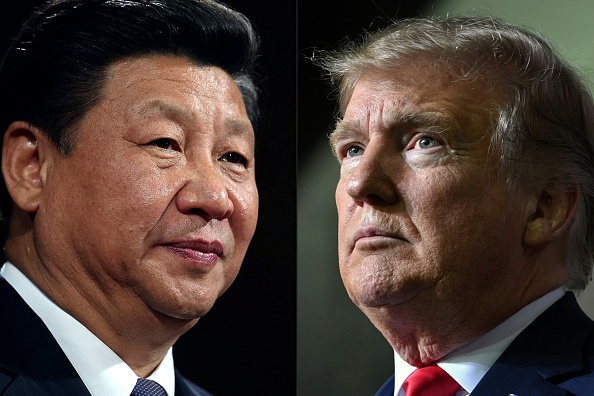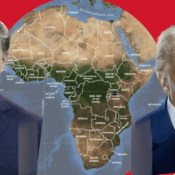
Trump introduces broad new taxes, and China responds with modest tariffs
President Donald Trump’s broad taxes on Chinese imports prompted China to respond with targeted tariffs on U.S. imports on Tuesday and to place a number of corporations, including Google, on notice for potential fines.
Beijing’s meek response to Trump’s 10% duty on all Chinese imports highlighted Chinese authorities’ efforts to negotiate with Trump in order to prevent a full-scale trade war between the two biggest economies in the world.
A U.K.-based research group called Capital Economics calculated that China’s new tariffs will affect around $20 billion in yearly imports, in contrast to the $450 billion worth of Chinese goods that were subject to the Trump levy, which went into effect at 12:01 a.m. ET on Tuesday (0501 GMT).
According to a note from Julian Evans-Pritchard, the company’s director of China Economics, “The measures are fairly modest, at least relative to U.S. moves, and have been calibrated to send a message to the U.S.”
In exchange for border and criminal enforcement concessions, Trump agreed to a 30-day halt on Monday, rescinding his last-minute threat of 25% tariffs on Canada and Mexico.
Later this week, Trump will meet with Chinese President Xi Jinping, according to a White House official.
Trump did not specify when he would impose tariffs on the European Union, but he hinted at it on Sunday.
Brussels would be prepared for difficult discussions, according to Ursula von der Leyen, head of the European Commission, the EU’s executive branch, but she emphasized the need of establishing the groundwork for a closer relationship with the EU’s biggest trading and investment partner.
“We will approach that with transparency and pragmatism. However, we will explicitly state that we will always defend our own interests, whenever and however necessary,” she stated in a speech.
Von der Leyen and Trump have not yet had direct conversations, according to a Commission spokeswoman, although the European Commission and the incoming U.S. administration have been in technical touch.
A 15% tax on U.S. coal and LNG and a 10% tax on crude oil, farm equipment, a few trucks, and large-engine cars that are exported from the United States to China are among the additional measures that China announced as the Trump tariffs went into force.
Alphabet Inc.’s (GOOGL.O) anti-monopoly inquiry was launched by China, according to a new report Internet. The parent company for Calvin Klein and the U.S. biotechnology business Illumina (ILMN.O) was placed on a list for possible penalties, along with PVH Corp (PVH.N), opens new tab.
Google refrained from commenting on the inquiry. When contacted for comment outside of typical U.S. business hours, PVH and Illumina did not reply.
METALS’ EXPORT REQUIREMENTS
China said that it was enforcing export restrictions on tungsten and other metals that are essential for solar panels, electronics, and military hardware.
Tesla’s (TSLA.O) Cybertruck is a niche product that Elon Musk has been marketing in China, and it may be subject to the 10% levy China announced on electric trucks imported from the US. Tesla was unable to comment at this time.
China’s additional tariffs won’t go into effect until Monday, which would give Beijing and Washington time to try to negotiate a settlement with Trump that Chinese authorities have said they expect to achieve as domestic demand in China slows.
Due to China’s trade surplus, Trump launched a two-year trade war with Beijing during his first term as president. Tit-for-tat tariffs disrupted global supply chains and hurt the global economy.
When Oxford Economics reduced its projection for China’s economic growth, it stated in a note that “the trade war is in the early stages, so the likelihood of further tariffs is high.”
Trump warned that unless Beijing stopped the flow of the deadly narcotic fentanyl into the US, he may raise taxes on China even more.
China has referred to fentanyl as America’s issue and stated that it will contest the levies at the World Trade Organization and implement more countermeasures, while maintaining the possibility of negotiations.
China buys around $6 billion worth of crude oil from the United States every year, making it a relatively minor source. The United States supplies China with little over 5% of its LNG imports.
Hong Kong stocks reduced gains, as crude prices continued to decline following China’s reprisal. Market worries over the possibility of a lengthy international trade war caused the dollar to appreciate while the Chinese yuan, euro, Australian and Canadian currencies, and Mexican peso all declined.
as a roller coaster of a day, U.S. markets began Monday with little change as Trump’s reversal on the application of levies on Canada and Mexico cut hefty losses in half. Global spirits manufacturer Diageo DGE.L warned that the duties might result in a $200 million cut to its operational earnings, but U.S. and international businesses were beginning to assess the impact of the taxes should they reappear in a month.
“It is possible to see tariffs being used as a recurring tool, which can be a key source of market volatility this year,” Gary Ng, senior economist at Natixis in Hong Kong, stated, even if the two nations (China and the United States) can compromise on some problems.
Relief was felt in Mexico City and Ottawa when Mexican President Claudia Sheinbaum and Canadian Prime Minister Justin Trudeau said they had reached an agreement to strengthen border security, halting 25% tariffs that were scheduled to go into effect on Tuesday for 30 days.
EU trade commissioner Maros Sefcovic stated that in order to avoid possible tariffs, he wished to have early discussions with the US.
“We believe through constructive engagement and discussion we can resolve this problem,” he added.
All Categories
Recent Posts
Tags
+13162306000
zoneyetu@yahoo.com



